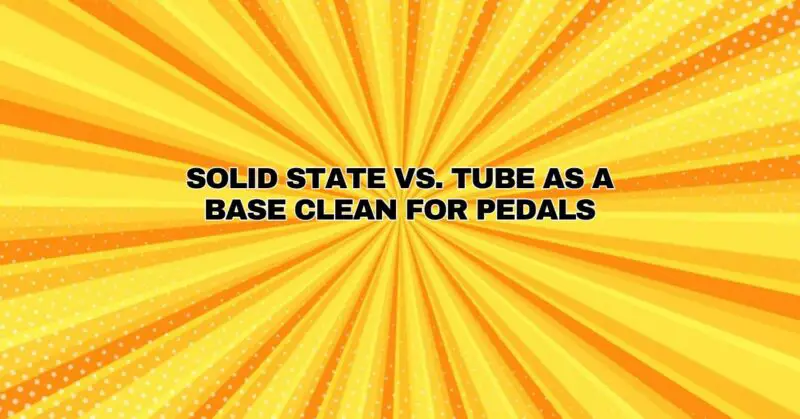The debate between solid-state and tube amplifiers has been a long-standing discussion among guitarists, each with its devoted followers. When it comes to using pedals to shape your guitar tone, the choice between a solid-state and a tube amplifier as a base clean tone is a crucial consideration. In this comprehensive guide, we will delve into the nuances of both options, exploring their characteristics, advantages, and how they interact with pedals to help you make an informed decision for your musical journey.
Solid State Amplifiers: The Clean Slate
Solid-state amplifiers use transistors and integrated circuits to amplify the guitar signal. They are known for their clean, transparent amplification and offer several advantages when used as a base for pedals:
Advantages of Solid State Amplifiers with Pedals:
- Clean Signal Path: Solid-state amps provide a pristine, uncolored canvas for pedals to work their magic. They faithfully reproduce the input signal, ensuring that the pedal’s effect is clear and unaltered.
- Consistency: Solid-state amps offer consistent performance, with minimal maintenance required. They are reliable workhorses suitable for gigging musicians who depend on pedal-driven tonal variations.
- Affordability: Solid-state amplifiers are often more budget-friendly than their tube counterparts, allowing guitarists to invest in a variety of pedals without breaking the bank.
Tube Amplifiers: The Warm and Harmonic Foundation
Tube amplifiers, often revered for their warm, organic, and harmonically rich tones, rely on vacuum tubes (valves) to amplify the guitar signal. When paired with pedals, tube amps create a unique synergy that many players find inspiring:
Advantages of Tube Amplifiers with Pedals:
- Natural Saturation: Tube amps tend to produce pleasing harmonic saturation when pushed to higher volumes. This characteristic can enhance certain pedal effects, such as overdrive and distortion, yielding a creamy and responsive tonal palette.
- Dynamic Response: Tube amps are renowned for their touch-sensitive dynamics. They respond dynamically to changes in playing technique and pedal input, allowing for expressive and nuanced performances.
- Versatility: Tube amps can cover a wide range of musical styles, from clean, shimmering tones to crunchy blues and searing high-gain sounds. Pedals can further extend this versatility, making them suitable for various genres.
Pedals and the Amplifier Choice:
The choice between solid state and tube amplifiers as a base clean tone largely depends on your musical preferences and playing style:
- Solid State for Versatility: If you seek a reliable, clean canvas for a broad range of pedals and musical styles, a solid-state amplifier may be the way to go. This choice offers affordability, consistency, and a transparent tone that allows pedals to shine.
- Tube for Character: If you crave the warm, harmonically rich tones that tube amplifiers provide, especially when paired with overdrive and distortion pedals, then a tube amp may be your preferred choice. The organic saturation and dynamic response of tube amps can bring your pedal effects to life in unique ways.
- Hybrid Solutions: Some guitarists opt for hybrid setups, combining the reliability of solid-state amplifiers with the character of tube-driven pedal effects. This approach allows for flexibility in crafting your ideal tone.
Conclusion:
In the world of guitar amplification and pedal-driven tones, both solid-state and tube amplifiers have their merits. The choice between them should align with your artistic vision, tonal preferences, and budget considerations. Whether you prefer the clean canvas of a solid-state amplifier to let your pedals shine or the harmonically rich foundation of a tube amp to infuse character into your effects, both options can lead to sonic landscapes limited only by your creativity and musical imagination.


